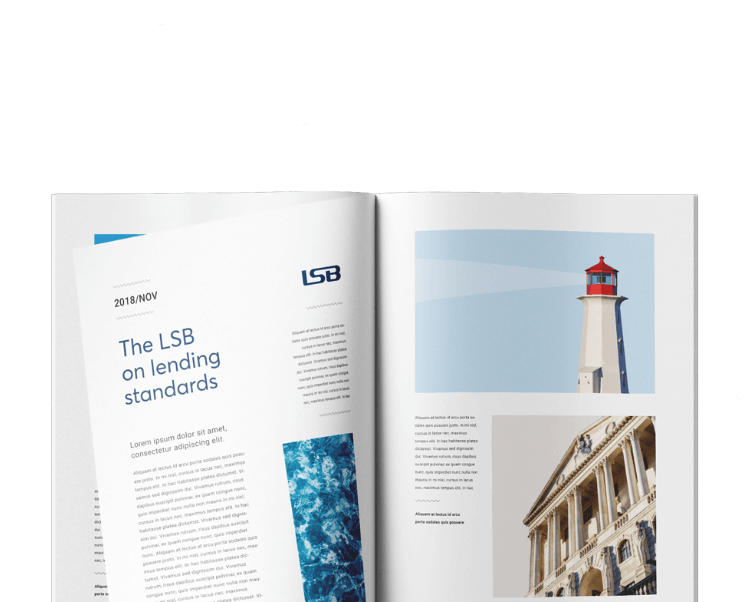LSB Chief Executive, Emma Lovell, really spoke at the Outsourcing in Collections Conference hosted by Intrum and CCR Magazine. You can read her speech from the day below.

*The notes below may differ from those delivered on the day*
Hello, my name is Emma Lovell, and I am the Chief Executive of the Lending Standards Board – the LSB. I’m really pleased to have been invited to talk to you today about outsourcing within the collections journey, including the top risks we see in this area and the steps that can be taken to achieve fair outcomes.
I am sure you will all agree that focusing on how we deliver fair outcomes and ensuring this includes outsourced services such as collections, is now more important than ever with Brexit, the pandemic, the war on Ukraine increasing energy prices, and the cost-of-living crisis creating a perfect storm of challenges, as well as an increase in people experiencing new or heightened financial difficulty. This means that the risk to customers of not fully understanding their circumstances and providing the right solution for them is higher than ever and outsourcing to firms who recognise and can overcome these challenges, is vital.
Today, we will explore this in more detail, looking at:
– the importance of relevant due diligence and oversight;
-encouraging customer contact and engagement; and
– the value of effective training, signposting and regular reviews to have the most effective conversations.
There will also be some time for questions at the end, so please do keep those questions in mind throughout this talk, as I would be more than happy to answer them and would love to hear your thoughts. But before we talk about this, I thought it may be useful to provide you with a little background information about the LSB.
The LSB is the primary self-regulatory body for the banking and lending industry in the UK. We have a clear goal – to drive fair outcomes for personal and business customers within financial services. We do this through robust, independent oversight of the Standards and Codes we set, which include the Standards of Lending Practice for business customers, personal customers and asset finance, as well as the CRM Code, which puts in place protections for customers from Authorised Push Payment scams. Our registered firms comprise the major UK banks and lenders, credit card providers, debt collection agencies and debt purchase firms, including some of you here representing your firms today. Signing up to, and importantly, adhering to the Standards and Codes which sit within our remit, is a clear indication that a registered firm is committed to best practice in the treatment of its customers.
Key risks and examples of best practice
Due diligence and oversight
Hopefully that has provided a clear understanding of the LSB and of what we will talk about today. Now, I thought it would be helpful to look at these top risks and some of the best practice steps you can take, in more detail.
As I briefly mentioned earlier, there is currently a perfect storm of challenges facing the financial services industry and it is vital that good customer outcomes are placed at the heart of all that we do. Therefore, selecting and outsourcing to firms who share the desire to do the best for customers, have a good reputation, and a strong approach to engaging customers is important, and to ensure this, a robust due diligence process is essential. This is something our Standards of Lending Practice for business and personal customers cover, placing a focus on the importance of conducting thorough due diligence to ensure each collections firm has the right values, approach and controls in place to achieve fair outcomes.
Firms should be sure, before they outsource, that not only is the selected partner ready and able to deliver the consistency of service customers should expect but that they themselves have the right processes in place to share the accurate information and to prevent any customers being outsourced that shouldn’t – such as those who are vulnerable.
Of course the financial landscape is also ever changing, and so lenders and debt purchasers alike need to keep their existing processes under review to ensure they take account of the cost-of-living crisis and other external factors. And so, as firms review their internal practices there needs to be a read across to those that they outsource to, to ensure they too are adapting and taking account of the evolving landscape and changing customer needs. Regularly reviewing and updating internal training for your own oversight team will also help ensure that the team know what to look out for when they are reviewing outsourced firms activity. Ensuring that the due diligence process and ongoing oversight remains relevant and captures new risk areas is critical to be able to provide assurance that those working on your behalf are adapting their approach accordingly to enable them to deliver fair customer outcomes
Now is an excellent opportunity to look at how you oversee your third parties and the information you gather; understanding what MI you have and where it may need adapting to swiftly capture new and emerging trends and ensuring that you are able to see where processes are and are not working. Ensuring the third party also has its own internal oversight, that is robust, risk based and tailored to external factors like the cost-of-living crisis, is also vital, so they can be sure their policies and processes are being followed, and good outcomes achieved.
Firms may wish to consider having direct relationship managers in place to work with key contacts at the outsourcing firm. This can help with regular dialogue and oversight as well as the dissemination of best practice guidance. Regularly reviewing your oversight programme and what it tells you is particularly important, because of course you cannot outsource your regulatory responsibilities for your customers.
Encouraging customer contact and engagement
Now I want to talk about customer engagement. Many customers simply cannot afford to pay in these trying times, they have no disposable income, and it isn’t just customers who were already on the bread line. More and more, it is customers who previously had good financial wellbeing but are now facing financial difficulty. This coupled with initiatives like the ‘don’t pay UK’ campaign, can make engaging customers challenging. This brings us onto the second risk and opportunity today which is customer engagement strategies.
Uncertainty is at an all time high, customers don’t know how they will be impacted by the cost-of-living crisis and other factors. They may be apprehensive to engage with financial organisations due to fear of the outcome of sharing details, and so effective communications and building trust are vital.
Customers may also not be aware of the support available to them and engaging and informative customer communications play an important part in this. Customer information on letters, apps, websites, and other channels should be reviewed to ensure they mention and address the cost-of-living crisis and that the information is easily accessible. We know some firms have created specialist cost of living contact centres, and actively promote the team, raising awareness of the additional support available for when customers need it. Whilst we know this isn’t possible for all firms, communicating whatever direct support you have for external situations, even if it’s just acknowledging the problem at hand, can help customers feel more able to open up.
Another example of this, outside of the cost of living crisis, is around scam awareness. The primary purpose of scam education is to prevent a customer from falling victim to a scam, and so messaging focused on encouraging customers to contact their payment service providers as soon as possible, can help to reduce the impact of scams. We saw good examples of this, during the pandemic, of proactive, relevant and specific scam awareness campaigns and consideration to the way in which that information was accessed. Being informed, or able to find the relevant information swiftly, can be the catalyst for action and better outcomes. We can agree I am sure that this is needed during this challenging time.
So, revisiting both your own communication strategies and understanding those of your selected third parties is paramount to tackle one of the biggest challenges facing the debt collection industry in recent history. Not only will it help ensure that you can learn from past communication campaigns and what did and didn’t work, but it will help to build new or revised customer engagement campaigns that are more suited to the current financial environment. For example, engagement from outbound calls may have dropped but inbound calls off the back of SMS campaigns may have risen. If so, what external factors might have played into this? We know that scams are on the rise, causing customers to become more wary of calls from unknown numbers – consider how this might have impacted your communication strategies and what you can learn from that.
For those of you that outsource, you will undoubtedly want to understand what new trends the third party are seeing and how they are using that information to tailor their approach. You too can use this information to assess whether you can do something differently before a customer account is outsourced.
Effective conversations
Of course once you have engaged the customer having effective, meaningful conversations is key to producing the best outcomes. This message I’m sure comes as no surprise, but it is an area we continue to see challenges in and is third top risk and opportunity that I will talk about
Customer circumstances and needs have become more complex, which can make conversations difficult, so a starting point is to ensure that your agents, and those at your outsourced partner, have the right skills, support and flexibility to really deliver the right outcomes. This begins with understanding the various ways the cost-of-living crisis is impacting both personal and business customers. This is a unique crisis and so staff should not be expected to rely purely on training for ‘business as usual’ financial difficulties. Instead, training should be refreshed, or new aspects introduced to support these changes.
Similarly, the soft skills of agents are vital if we are to have sensitive and meaningful customer discussions. This is why it is important for firms to train staff on how to understand and be sensitive to a customer’s situation in the moment, and to display empathy. Empathy isn’t a set of responses to a statement made by a customer, it is a behaviour, it is displayed through action and not just words for it to be truly effective. This may seem quite obvious, but we know is it isn’t easy and it requires continuous attention to deliver properly. It is an area that as an industry we need to really focus on over coming months. As with those areas I have already covered this morning, this is an area that firms should revisit internally but also through their oversight of outsourced partners. Checking that training is relevant to the current environment, and that those in assurance roles also understand what good looks like so that any feedback and coaching is impactful and timely.
Over the course of the remainder of the year, the Insight team at the LSB, will be delving further into empathy in action – what this means, how to embed it and training considerations. We will shortly launch an empathy in action workshop for registered firms so I would encourage you to look out for that on our website.
There won’t always be a straightforward solution to customers adapting needs. No doubt your teams will already be having conversations with customers with no disposable income or who cannot afford basic living costs and will continue to do so. They will also be seeing customers who previously had their head above water and are rapidly facing real financial difficulty. They need to understand how they are able to help those customers and critically when the customer needs more specialist support.
Signposting can also be vital for many people struggling. The positioning and timing of signposting is critical if it is to be effective and bring around positive engagement. It should take place at the relevant time in a conversation, the agent should understand what the organisation does and does not do, the customer should be clear on how that organisation can help them with their needs and be given the time to actually engage with the third party.
Those of you that outsource will have in place regular reviews of customer engagement through call listening and customer journey reviews. Where we see these processes working well, firms pay particular attention to risk areas in a call to ensure they are delivering as they should and where they aren’t put in place measures to improve outcomes.
As with the other areas we have discussed today, as the cost of living crisis continues to unfold and as you gather more information from your third parties in respect of customer behaviour, contact and the impact of the crisis, your oversight and assurance process should evolve to ensure they address concerns and changes.
Now, I just wanted to spend a moment to remind us all to also support staff working on the front line as well– as they may to be impacted by the current crisis or have similar experiences and difficult conversations with customers can be challenging emotionally. During the pandemic, we published a piece of qualitative research ‘The meaning of Life Experience’ which reinforces this point really. We interviewed a number of organisations and found that across those contributing, it was thought that the life experience of individuals had a role to play in the experience a customer received. Regular supervision and safeguarding techniques can help to ensure agents working on the front line are supported, so they can go on to have effective, meaningful conversations with your customers. You may already have focused on these points in your own organisation, and as we address these important changes internally, we should also ensure that our outsourced partners are taking the same action. This shared ethos and way of working can help build trust and will demonstrate to your customers that you and your partners are equally committed to fair outcomes.
Conclusion
I cannot finish this speech without acknowledging that the pressure on firms is higher than ever right now. We recognise this, and that is why it is so good to see so many of you here today, taking the time to understand what you can do to support your customers.
I hope that the examples I have shared show that good outsourcing does not have to involve reinventing the wheel, but can instead focus on building upon some of the controls and processes that you will already have in place. Above all else, we should all be aware of the changing environment and be ready to adapt. Thank you.









